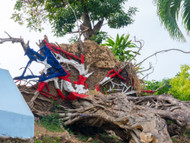Puerto Rico Highlights the Importance of Home Water Filtration
Posted by Joel Pelina on Sep 29th 2022
On Sunday, September 18, 2022, Hurricane Fiona made landfall in Puerto Rico, causing torrential rain and massive flooding throughout Puerto Rico and the Dominican Republic for over a day before continuing northward and increasing in strength. Just five years ago, on September 16, 2017, Puerto Rico was struck by the Category 5 Hurricane Maria, causing untold damage and flooding throughout the island. In both situations, Puerto Rico suffered from widespread flooding, power loss, and damage to roads, homes, and businesses. And both cases highlight the importance of some form of home water filtration to ensure a potable water supply.

Puerto Rico has suffered tremendous damage from hurricanes
- The prolonged torrents of rain, the ferocious winds, and the crashing waves caused by both Hurricane Maria and Hurricane Fiona subjected Puerto Rico to mudslides, catastrophic floods, and often island-wide power loss.
- Winds of up to 85 mph damaged or destroyed roofing, power transmission lines, bridges, fences, and trees.
- Some parts of the island were subjected to 30 or more inches of rain in just a short period of time.
- Flooded streets and overflowing rivers made many areas unpassable.
- Some neighborhoods were flooded all the way to the roofline of their houses.
- Hundreds of people are trapped in shelters due to flooding, fallen trees, mudslides, and collapsed bridges.
- The power grid was damaged across the entire region, leaving vital utilities unable to function.
- Flooding, overflowing sewage lines, and damage to water pipes combined with power-loss and overloaded treatment plants to render at least two-thirds of the populace without safe drinking water.
Puerto Ricans have learned not to rely on outside help
- Because of Puerto Rico’s distance from the mainland United States, it can be difficult for aid to arrive in a timely manner.
- This was shown after Hurricane Maria, when aid from the government or other emergency institutions was slow to arrive (or failed to arrive at all), and many projects and repairs had not been completed by the time Hurricane Fiona struck, five years later.
- Some areas of Puerto Rico did not have power restored for at least nine months after Hurricane Maria, which also meant they had no source of safely treated water in their homes.
- Government rebuilding efforts after Hurricane Maria did not switch to more distributed, decentralized power generation – such as rooftop solar – allowing Hurricane Fiona to cause widespread damage to the centralized power system.
- Town administrators learned to stockpile resources and find solutions for their communities without federal aid or the promised help from corporations, both of which residents have learned they cannot rely upon.

Clean water remains a pressing concern
- Without electricity, water treatment plants cannot operate and provide clean water to residents for drinking, bathing, or flushing toilets.
- As of Tuesday, September 20th, only about 40% of Puerto Ricans have access to clean water.
- After Hurricane Maria, some desperate residents gathered water for use from swollen rivers and lakes, but flooding caused many of these sources to be polluted with raw sewage. After Hurricane Fiona, a similar concern remains.
- Even communities with running water are advised to boil their water before use due to potential contamination from the storm and flooding.
- Many communities have turned to bottled water for drinking, but supplies are very limited, and residents must consider whether they can afford to use bottled water for washing and bathing as well as drinking and cooking.
Home drinking water filtration systems may offer a solution
- During catastrophic breakdowns in power and water infrastructure, the right home water filtration systems may offer a better solution for safe water sources.
- A Multipure Aqualuxe filter coupled with an emergency hand pump and adapter can offer a way to purify and filter water of many contaminants, including bacteria, viruses, and cysts.
- Alternately, a Water Emergency Treatment System is designed specifically to render water supplies safe for consumption through a combination of filters, hand pumps, storage container, and purification tablets.
- With a water filtration/purification solution in the home, a cleaner, safer water source can be procured without having to rely on slow-acting emergency services or limited plastic bottled water supplies.
While not a cure-all solution for every natural disaster, the fact remains that a means to provide clean water in emergencies is invaluable in locations like Puerto Rico that are prone to catastrophic storms and limited emergency assistance. Sometimes, the best way to protect your home and family is to ensure that you have provisions in place beforehand to deal with unforeseen circumstances. In this case, at least, Multipure can offer a potential solution before the next emergency occurs.
References
- Bacon, John, and Jorge Ortiz. “Hurricane Fiona overwhelms Puerto Rico with flooding, mudslides; power partially restored.” USA Today. September 19, 2022. https://www.usatoday.com/story/news/nation/2022/09/19/hurricane-fiona-puerto-rico-dominican-republic-updates/10424046002/
- Begnaud, David, and Analisa Novak. “Five years ago Hurricane Maria knocked out Puerto Rico's power grid. They were only "just starting to rebuild" when Fiona hit.” CBS News. September 20, 2022. https://www.cbsnews.com/news/hurricane-maria-luma-energy-power-grid/
- Coto, Danica. “Puerto Rico still mostly without power and running water as Fiona hits Turks and Caicos.” Los Angeles Times. September 20, 2022. https://www.latimes.com/world-nation/story/2022-09-20/hurricane-fiona-wallops-turks-caicos-puerto-rico-stunned
- Hernandez, Arelis. “Hurricane Maria hit Puerto Rico 5 years ago. Recovery in many ways had just begun.” The Washington Post. September 20, 2022. https://www.washingtonpost.com/nation/2022/09/20/hurricane-maria-five-years-later/
- Lakhani, Nina. “Puerto Rico battles blackout and lack of safe water in wake of Hurricane Fiona.” The Guardian. September 19, 2022. https://www.theguardian.com/world/2022/sep/19/puerto-rico-hurricane-fiona-power-water
- Neuman, Scott. “5 years on, failures from Hurricane Maria loom large as Puerto Rico responds to Fiona.” NPR. September 20, 2022. https://www.npr.org/2022/09/20/1123846384/puerto-rico-hurricane-fiona-hurricane-maria-anniversary
- Romo, Vanessa. “Puerto Rico has lost more than power. The vast majority of people have no clean water.” NPR. September 20, 2022. https://www.npr.org/2022/09/20/1123984002/hurricane-fiona-puerto-rico-lost-more-than-power-vast-majority-no-clean-water

